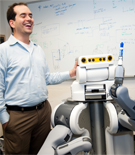
The SEAS Robotics Program
 Robotics and Mechatronics Lab: The GW Robotics and Mechatronics Lab conducts advanced fundamental and applied research in robotics, mechatronics and controls that enables systems to exhibit intelligent, goal-oriented behavior, and develop novel mechatronics devices to monitor and control systems. Applications span a range of social and national needs, including: autonomous mobile robots for search & rescue, security, environment monitoring, and defense; advanced medical devices and robotic systems for surgery, rehabilitation, and elderly care; novel sensors, actuators and MEMS for biomedical applications; and robotics for home automation and education. Information on ongoing research activities can be found here.
Robotics and Mechatronics Lab: The GW Robotics and Mechatronics Lab conducts advanced fundamental and applied research in robotics, mechatronics and controls that enables systems to exhibit intelligent, goal-oriented behavior, and develop novel mechatronics devices to monitor and control systems. Applications span a range of social and national needs, including: autonomous mobile robots for search & rescue, security, environment monitoring, and defense; advanced medical devices and robotic systems for surgery, rehabilitation, and elderly care; novel sensors, actuators and MEMS for biomedical applications; and robotics for home automation and education. Information on ongoing research activities can be found here.
 Planning, Optimization & Simulation for Robotics (POSITRONICS) Lab: The Positronics lab investigates methods at the
intersection of planning, optimization and optimal control, and simulation and dynamics toward efficient autonomous wheeled,
manipulator, humanoid, and legged robots. The lab's current research is focused in four areas: 1) autonomous mobile
manipulation; 2) robust and fast dynamic simulation; 3) high performance vehicles and legged robots; and 4) theory of
robotics.
Planning, Optimization & Simulation for Robotics (POSITRONICS) Lab: The Positronics lab investigates methods at the
intersection of planning, optimization and optimal control, and simulation and dynamics toward efficient autonomous wheeled,
manipulator, humanoid, and legged robots. The lab's current research is focused in four areas: 1) autonomous mobile
manipulation; 2) robust and fast dynamic simulation; 3) high performance vehicles and legged robots; and 4) theory of
robotics.
 Autonomous Robotics & Perception Lab: If mobile robots are to become ubiquitous, we must first solve fundamental problems in perception. Before a mobile robot system can act
intelligently, it must be given -- or acquire -- a representation of the environment that is useful for planning and control. Perception comes before action, and the perception problem is one of the most difficult we face (that's why we study it!).
Autonomous Robotics & Perception Lab: If mobile robots are to become ubiquitous, we must first solve fundamental problems in perception. Before a mobile robot system can act
intelligently, it must be given -- or acquire -- a representation of the environment that is useful for planning and control. Perception comes before action, and the perception problem is one of the most difficult we face (that's why we study it!).
 Smart Systems Lab: One of the keys to efficient design is multifunctionality, a concept that Nature has perfected over millions of years of evolution. True multifunctionality
means that structure, sensing, actuation, etc. are fully integrated; they are not discrete components bound together to make a system. In the Smart Systems Lab, we turn to biology to inform designs that solve hard problems in aerospace and energy systems, where size and weight constraints are critical. We use smart materials, adaptive structures, and intelligent control systems as our tools to tackle these issues.
Smart Systems Lab: One of the keys to efficient design is multifunctionality, a concept that Nature has perfected over millions of years of evolution. True multifunctionality
means that structure, sensing, actuation, etc. are fully integrated; they are not discrete components bound together to make a system. In the Smart Systems Lab, we turn to biology to inform designs that solve hard problems in aerospace and energy systems, where size and weight constraints are critical. We use smart materials, adaptive structures, and intelligent control systems as our tools to tackle these issues.
 Flight Dynamics and Control Lab: This lab studies modern geometric nonlinear control approaches on manifolds, with applications to complex aerospace systems. The current research is focused on geometric numerical integration, computational optimal control, geometric control, and estimation. Applications include dynamics of asteroid, spacecraft formation reconfiguration, satellite attitude dynamics, tethered spacecraft, unmanned aerial vehicles, and robotics.
Flight Dynamics and Control Lab: This lab studies modern geometric nonlinear control approaches on manifolds, with applications to complex aerospace systems. The current research is focused on geometric numerical integration, computational optimal control, geometric control, and estimation. Applications include dynamics of asteroid, spacecraft formation reconfiguration, satellite attitude dynamics, tethered spacecraft, unmanned aerial vehicles, and robotics.
 Center for Intelligent Systems Research (CISR): The CISR was chartered at GW in 1996 to conduct fundamental and applied research in intelligent, dynamic systems and controls. Research is conducted in intelligent vehicles for semi-autonomous and autonomous driving, collision avoidance, and human-in-the-loop/driver modeling and hybrid control systems. Coordinated mobile robotics, communications and controls, and neurodynamics are also among current areas of research.
Center for Intelligent Systems Research (CISR): The CISR was chartered at GW in 1996 to conduct fundamental and applied research in intelligent, dynamic systems and controls. Research is conducted in intelligent vehicles for semi-autonomous and autonomous driving, collision avoidance, and human-in-the-loop/driver modeling and hybrid control systems. Coordinated mobile robotics, communications and controls, and neurodynamics are also among current areas of research.